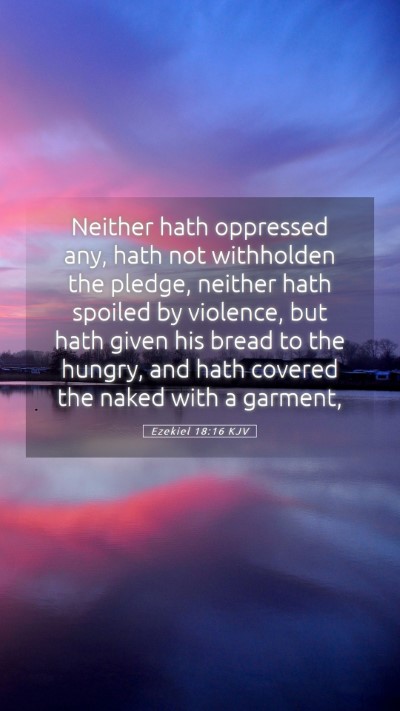Bible Verse Explanation: Ezekiel 18:16
Verse: Ezekiel 18:16 - "Neither hath oppressed any, hath not withholden the pledge, neither hath spoiled by violence, but hath given his bread to the hungry, and hath covered the naked with a garment."
Understanding the Verse
Ezekiel 18:16 presents a compelling image of individual righteousness contrasted against sin. This verse highlights the qualities of a just individual who follows God's commandments and demonstrates integrity in his dealings with others. Through the examination of this specific text, readers gain insight into the broader themes found throughout the Book of Ezekiel regarding justice, mercy, and personal responsibility.
Bible Verse Commentary Insights
- Matthew Henry's Commentary:
Henry emphasizes the moral quality of the individual described in the verse. He notes that the person in question engages in actions that reflect a sincere love for both God and neighbor. By not oppressing others or engaging in deceit, they exemplify a lifestyle that is pleasing to God. Henry also links this behavior to the wider context of personal accountability—each person is responsible for their own actions before God.
- Albert Barnes' Notes:
Barnes points out that this verse serves as a criterion for righteousness. The focus here is on ethical behavior; the individual treats others with respect and care, indicating a true reflection of God's love. Barnes highlights the importance of both positive (acts of kindness) and negative (abstaining from harm) aspects in the description of a righteous person. He argues that this verse encapsulates the essence of God’s expectations from humanity regarding social justice and compassion.
- Adam Clarke's Commentary:
Clarke elaborates on the social implications of the actions mentioned in Ezekiel 18:16. He discusses how these acts of kindness—providing bread to the hungry and clothing the naked—represent not only a moral obligation but a significant expression of community. Clarke encourages readers to see this as a call to action in today’s world, where social inequities often exist. He asserts that every believer has a role in contributing positively to their community, mirroring the character portrayed in this verse.
Biblical Exegesis and Themes
This verse can be analyzed through various theological themes:
- Justice and Righteousness: The primary focus in Ezekiel 18:16 is clearly directed towards justice. The righteous person is depicted as standing against oppression, which aligns with numerous other Scriptures that call for just treatment of the marginalized (e.g., Isaiah 1:17).
- Personal Accountability: The context of this chapter emphasizes how individuals are judged for their actions rather than their lineage or ancestry. This personal accountability is a recurring theme throughout the Bible, urging believers to examine their own conduct (Romans 14:12).
- Compassion and Care for Others: Acts of compassion are central to this verse. The reference to giving food to the hungry and clothing the naked reflects the heart of God’s law concerning love towards others. This theme resonates with Jesus' teachings in the New Testament (Matthew 25:35-40).
Cross References
- Isaiah 58:7: Highlights the call to share bread with the hungry and to care for the needy.
- James 1:27: Emphasizes pure religion as looking after orphans and widows in their distress.
- Matthew 25:40: Portrays acts of kindness as service to Christ Himself.
Application in Daily Life
This verse invites individuals to reflect on their daily interactions and choices. How can one embody the true spirit of Ezekiel 18:16 today?
- Engage in Acts of Kindness: Seek opportunities to help those in need, both materially and emotionally.
- Practice Integrity: Ensure that personal and professional dealings are characterized by honesty and fairness.
- Build Community: Invest time in establishing supportive and uplifting relationships to foster a caring society.
Conclusion
Ezekiel 18:16 serves as a profound reminder of the moral and ethical standards expected of believers. By combining insights from various biblical commentaries, one gains a holistic understanding of this verse that transcends mere reading. It calls for a life lived in justice, compassion, and responsibility—qualities that define not just individual followers of Christ but the community as a whole. As you engage with Scripture and seek biblical wisdom, let the teachings of Ezekiel inspire deeper exploration into what it means to live out God's principles in today's world.


